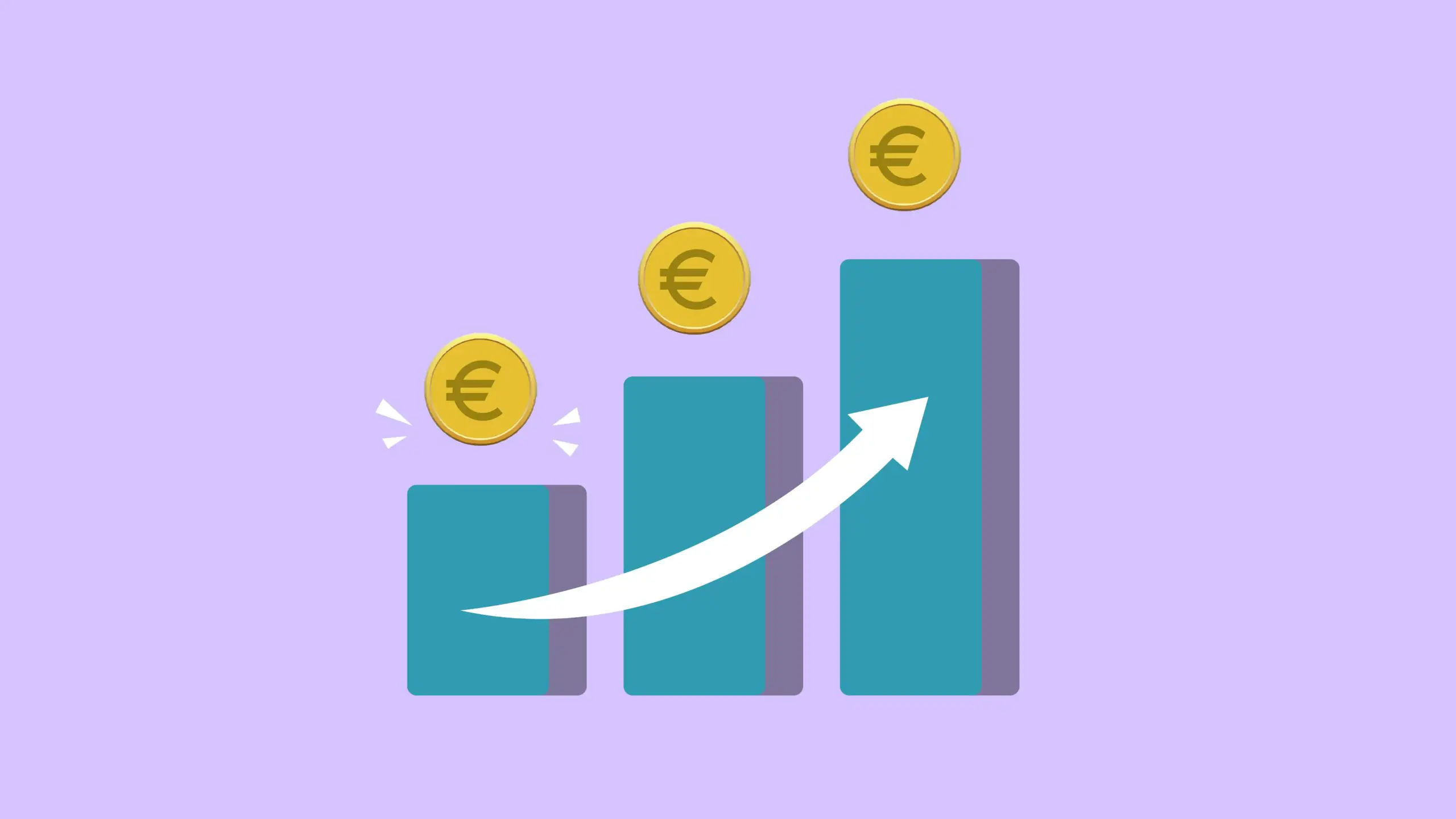Averaging up stocks is a technique that can be used in stock trading to increase the average price of a security. It works by buying more shares of a security as it goes up, in the hopes that it will keep going up.
There are pros and cons to averaging up, and it's important to understand when it is and isn't appropriate to use this strategy. In this article, we'll take a look at what average up means, how it works, how to do it, and when you should consider using it in your own stock trading.
What is the meaning of average up?
The meaning and purpose of averaging up is to buy more shares of a stock as the price keeps going up. Although it increases your average cost basis, this strategy is often used by long-term investors.
Investors who use a dollar-cost averaging strategy will often buy a certain amount of dollars of a stock, and the price might be higher or lower. This means that sometimes a DCA investment strategy might rely on averaging down or averaging up.
Averaging up example
For example, an investor buys 100 shares of XYZ at $50 per share. The price increases to $60 per share and the investor buys another 100 shares. By doing so, the average cost basis for the 200 shares is $55 per share.
In this scenario, the investor has averaged up from $50 as a cost average to $55. This may seem like a small difference, but over time it can have a large impact.
It can also seem counterintuitive to other investment strategies such as averaging down, but it's important to remember that the goal of this strategy is to keep acquiring more shares, not to turn a profit immediately.
Average up is a contrarian strategy that goes against the natural human tendency to sell when an investment has made a profit. However, if you have a strong conviction in a company or believe that the market is underestimating it, averaging up can be an effective strategy.
How to average up in stocks

When the price of a stock you own keeps rising, it becomes more expensive to buy more shares. However, just because the price has gone up, it doesn't mean the security is overvalued.
To average up, you can use a 'dollar-cost-average' strategy to systematically buy more of the security as it becomes more expensive.
For example, buying 100 shares of a company each month, regardless of the price. This strategy can work well for companies that are consistently growing and have a long-term upward trend.
You should also have a plan in place for when to sell if you prefer the lump sum strategy. If you are investing a large sum of money at once even if the price has risen, you may be able to get more shares before the price continues to increase.
However, it's important to still be aware of a company's long-term potential and not just blindly buy because the price is going up. This will help you take profits along the way and avoid holding on to a security that has peaked.
There are three situations in which you should consider averaging up:
- Long-term holding
- Undervalued stock
- Stocks that are ready to spike
Long-term holding
If you own a stock for the long-term you might choose to follow a dollar-cost averaging strategy and buy a certain amount of shares. This makes sense because you plan on holding the company for a long time, and the price is not the most determinant factor in your decision. However, it is advisable to avoid this approach if the stock is already overvalued.
Undervalued stock
An undervalued stock whose price remains lower than the company’s intrinsic value is also the type of situation you should consider averaging up. This is because despite the initial spike in the stock price, the company might still be undervalued, and the upward movement can draw the attention of more investors.
Stocks that are ready to spike
There are also stocks you own that could be about to release a piece of important information about the company and its prospects, and this is also an ideal situation to consider averaging up. If the company is about to release positive information, or a catalyst is coming to fruition, you should consider buying more shares.
When to average up stocks
The key to successfully implementing the average-up strategy is to have conviction in your investment thesis. You must believe that the stock is undervalued and that it will keep rising in value, or you want to hold the stock for years to come, and you keep investing in it.
It would also be a good time to average up if an earnings report beats expectations or the company releases positive news. This is because there is a higher chance that the price will continue to rise after these catalysts.
If a company has a new competitive advantage or its products are in high demand, these would be good indicators that the company is undervalued and has the potential to continue growing.
Some companies that participate in essential needs such as waste management, healthcare, and food delivery tend to be less impacted by economic downturns. As a result, these types of companies may also be good candidates for averaging up.
The S&P 500 on average returns about 10% annually. Of course, there will be times when the market as a whole falls and your stocks will decrease in value. However, if you keep averaging up with an index fund that tracks the S&P 500, you will eventually make money in the long run.
If you only have a small position in a great company and would like to own more shares, averaging up can be a way to slowly increase your position size.
For example, if XYZ company makes up only 2% of your portfolio and you believe that it will continue growing, you may average up to reach your goal of 5% allocation. Even if the company's share has already gone up in value, it can be profitable to keep buying more for longer-term growth.
When should you avoid averaging up?

If you keep averaging up and the company is not as strong as you thought, you may find yourself in a situation where you are holding shares of an overvalued company.
Another reason why you should avoid averaging up is if the market is not in your favor and you are about to lose money on your position.
For example, if the market is about to crash, you may want to reconsider averaging up. The reason why you might want to avoid increasing your average cost basis in this scenario is that you may be able to buy even more shares at a lower price.
Of course, it can be difficult to know when the market is about to crash, however, if the signs are clear and you keep averaging up, you may find yourself holding an even larger position in a company that has lost significant value.
Sometimes investors can become attached to certain investments and will keep averaging up. If the company is financially struggling, no longer has a competitive advantage or the industry is in decline, it may be time to avoid adding more shares.
Scandals from leadership and malpractice from management can also be a reason to reconsider averaging up your position. If you continue to average up in this scenario, you would be giving your hard-earned money to management that isn't doing a good job of running the company.
A final reason to avoid averaging up is if you have already built up a large position in the stock. If you own a significant number of shares, it may not be worth it to continue averaging up and increasing your risk. This is because your portfolio will eventually be heavily weighted in one stock, which can be dangerous.
This would go against diversification and if there is an event that hurts the company, your portfolio will take a significant hit.
These are a few reasons why you might want to avoid averaging up. Of course, there are also more risks to consider when buying stocks that have already gone up, so always do your own research and never invest more than you can afford to lose.
Risks of averaging up
The most financially dangerous risk of averaging up is that it can lead to overtrading.
Overtrading is defined as entering too many trades in a given period of time, and it’s something all traders need to avoid.
When you average up, you’re effectively increasing your position size and therefore your risk.
This can lead to some very dangerous situations, especially if you don’t have a proper risk management strategy in place.
Averaging up can also lead to emotional decisions. If you’re averaging up on a losing trade, you’re effectively doubling down on your original decision. This can lead to some very emotionally charged trading decisions, like FOMO which is never a good thing.
As a long-term investor, you might think that averaging up has no risks. Especially if the company is strong. However, disruptions within industries can happen at any time.
Examples of the risks of averaging up
For example, you might have thought a taxi company would be here forever because people will always need to get around.
But then Uber came along and disrupted the whole industry. And now, taxi companies are struggling to stay afloat. So, even if you’re investing in a strong company, there’s always the risk of disruptive forces that can come along and change everything.
Even if you start averaging up into the latest disruptive company, new technology can just be around the corner. Using the transportation example, Robo-taxis might be the next big thing and they could completely disrupt the taxi industry once again.
Averaging up can also lead to over-concentration in your portfolio. If you have a few losing positions and you keep averaging up, you’re going to end up with a very concentrated position in a specific stock or sector.
Finally, the risk of averaging up is that it can lead to biased investing and overconfidence. This is because the more you have invested, the easier it is to become susceptible to denial. If the investment no longer has strong fundamentals, you might decide to look the other way. For example, you may begin hoping rather than analyzing if the news starts to go against you.
Advantages of averaging up
The main advantage of averaging up is that it allows you to increase your position size within a company. This can allow you to reap the rewards as the company continues to grow.
Averaging up can also help you take advantage of compounding returns. Compounding returns are when the gains from an investment are reinvested and earn additional gains. The more frequently you reinvest, the greater your potential gains.
This strategy can also help increase your income if you are a dividend investor. This is because companies pay dividends based on how many shares they own.
Some income investors may not care about the average cost basis but would like to own as many shares total to receive more dividends.
Example of the advantages of averaging up
For example, let's say a company pays out a $0.10 monthly dividend. The investor currently owns 10,000 shares. This means he receives $1000 in passive income from his investment. This pays for his rent.
However, the rent has increased to $1200. The investor may want to own another 2000 shares just to receive more income to cover his rising living expenses. Even if the price has gone up per share, he might not care because averaging up will help with his personal monthly cash flow. This can help him live rent-free!
Ultimately, the advantages of averaging up depend on each individual investment. It also depends on what the investor is trying to accomplish. To understand if there is an advantage in averaging up, you should consider all possible outcomes and what your goal is for the investment.
Is averaging up bad or good?
Averaging up can be both a good decision and a bad decision, and it depends mostly on the stock you choose to average up. Some companies are not worth investing in for the long-term, and for that reason, you want to avoid averaging up those positions.
Additionally, you also want to make sure that your investment horizon is long enough, and that you will actually hold the stock for a long time.
Should you average up stocks?
Investors should average up stocks they plan to hold for the long-term or undervalued stocks that continue to be undervalued despite increasing in price. If you are not planning on holding the stock for the long term, or you are just trying to take advantage of short-term movements, the risk of averaging up is higher. Take that into consideration when deciding whether or not to average up.
Conclusion
Averaging up can be good or bad depending on many different factors. However, it's important to understand this investment concept. You may be averaging up and not realizing the potential risks or you may not know that averaging up can be beneficial. Either way, it's crucial to do your own research and never blindly invest in anything.

